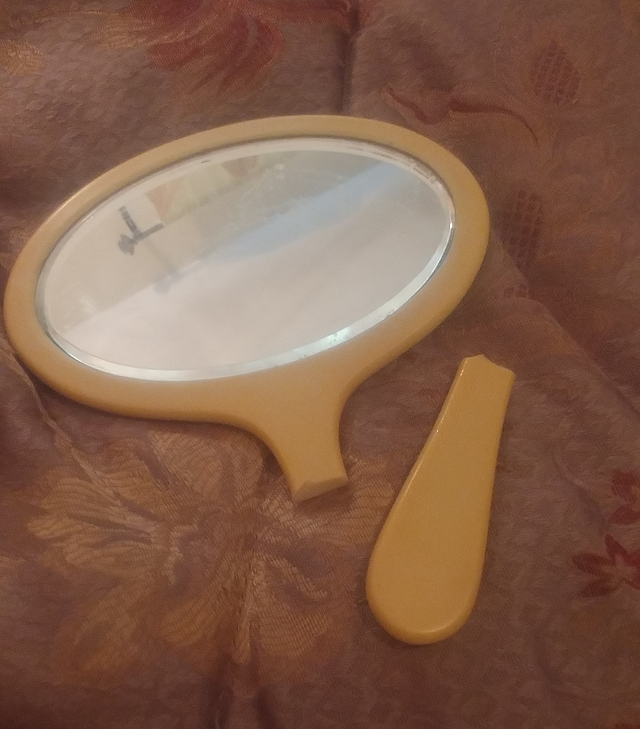
The summer after my grandparents died (that is, my father’s parents), we traveled from Michigan to Calgary, Alberta to wrap up things concerning their belongings and other affairs. I was only ten at the time. We used to travel to visit them every other summer, and that would have been a “visit” summer. It was a summer of many changes. My paternal grandparents had died, my older sister had just gotten married, and my brother was about to start college at the local community college. So the trip to Calgary was a marker for changes and memories. There were many small things that came from that household that would remind me of my grandparents. For instance, I eventually inherited a lovely Windsor arm chair that had been my grandmother’s favorite seat.
I like sitting in it, for not only is it a lovely chair, it brings back memories of my grandmother. It needed reupholstering by the time I got it, so I selected fabric that was “me” (black and gold with dragons in the weave).

But among the things from that household, I gained a hand mirror that had been my grandmother’s. An early plastic frame and handle, but the shape was nice, a wide oval that gave one a good view of one’s face when putting on make-up. It has been my preferred mirror since that time, even though the quality of the reflection had actually deteriorated.
But I’m not ten any longer, and I expect I have had it considerably longer than my grandmother did. To her, I expect it was just a nice mirror. But to me it was my grandmother’s mirror.
Then recently I dropped it, and the bakelite plastic handle broke.

Now, when I mentioned “mental health” in the title, I do not mean to imply I have any superstitions about breaking mirrors. I don’t. (Besides, as you can see from the picture, the mirror itself isn’t broken any way – heh.) It’s about how a deep seated depression in my psyche has handled objects of meaning as part of my mental defenses.
Depression is no easy thing to talk about, even when you are talking with people who are sympathetic. Depression is a complex combination of both personal mental factors and biochemistry of the brain. The brain is a very adaptable organ, and if you get the neurons and synapses used to responding in a certain way, using certain chemicals, it’s hard to break that pattern. And if certain reactions are begun and set when one is a very young child (in my case, while I was two years old), it isn’t easy to change them. A bit of chemistry and a lot of counseling are required to make changes in those patterns.
In my case – the short version – I was not ready at age two to gain a younger sibling. I couldn’t yet understand the change in attention I got, going from the favored pet of the family to a child left to my own devices, because the baby needed attention. So that two year old developed some defenses against the emotional turmoil of changes. Part of that was developing a strong attachment to physical objects, because they wouldn’t change on me, especially if they were significant in some way. (This is one way a hoarder is created.) But another one of the defenses, and one that has sabotaged me many times in my life, is Avoidance. Putting off dealing with things, putting off making changes even if they were changes I wanted to make in my life. And it was a problem created by that Avoidance pattern that finally propelled me to get counseling. I finally admitted to myself that intellectually knowing the causes of my depression was not enough to actually deal with that depression and overcome the effects of it in my life.
I’ll be upfront and admit that my mental health concerns are not as dangerous as what others may suffer. But that’s not the point: the point is that I was letting my depression and its reaction patterns hinder me in living a fuller life. Once I finally admitted to myself that I could not change those patterns by myself, I was ready to commit myself fully to digging in and healing that wounded two year old in me, and discarding her now-useless defenses.
Early in counseling, my counselor asked one question that brought me to a full stop. I had been describing how I resisted change, and procrastinated about things, and how frustrating I found it when I tried to kick that habit. He asked: “What purpose does the resistance serve?” It never had occurred to me that there might have been a purpose to the behavior – at least at some point in the past. Realizing that has made all the difference, and has helped me on the way to a healthier (and, ideally, more consistently happier) mindset. I’m still a work in progress on that front, but progress is being made.
Which brings me back to the broken mirror.
The day I dropped it, and the handle broke off, I looked at it with regret. It was still caught up in my memories of my grandmother, and I didn’t want to lose the combination of object and memories. I even tried fixing it with superglue, but the break was at the weakest point in the handle, and the glue on the bakelite wasn’t strong enough to handle the weight of the glass. The handle separated again.
I sat there looking at the two pieces and mulled over memories of Grandma, of the satisfaction I’d gotten from the service of the mirror (like I said, it was a nice useful shape). And I thought about how, if that break had happened even a couple of years earlier, I would have been very upset about it. The tangle of emotions, memory, desire for the security of symbols of affection, all that would have distressed me a lot, I think. But by the time it broke, I could separate out those things in my mind. I’m not going to lose the memories of my grandmother (God willing!). The mirror really did need to be replaced, because the reflective backing was aged and cloudy and not really effective. I can let it go. And silly as it might seem to someone else, that’s an achievement for me. The mirror had served its purpose, long beyond its best service in fact.
It is this complex mix of the significance of things that makes it difficult for people to talk about their own mental distresses. It’s not necessarily just the circumstances that the person may be facing, circumstances that everyone agrees are stressful. It’s that there are so many seemingly small things (to an outsider) that have taken on great significance to the depressed individual: trying to explain to someone why the broken plastic handle of a hand mirror was a big deal would have just raised strange looks and questions of why it would have upset me (that is, if it had happened several years ago).
Mental health is worth striving for. Nobody should fear setting out on the quest for it.


